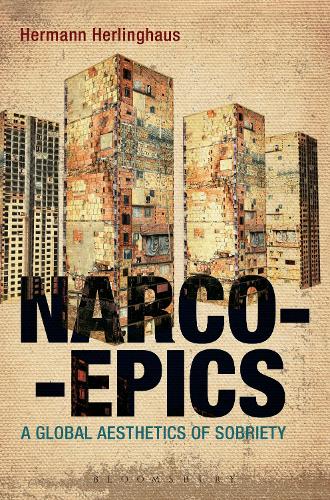
Narcoepics: A Global Aesthetics of Sobriety
(Paperback)
Available Formats
Publishing Details
Narcoepics: A Global Aesthetics of Sobriety
By (Author) Professor Hermann Herlinghaus
Bloomsbury Publishing PLC
Bloomsbury Academic USA
14th March 2013
United States
Classifications
Tertiary Education
Non Fiction
Literary theory
302.23
Physical Properties
Paperback
270
Width 152mm, Height 228mm, Spine 22mm
460g
Description
Narcoepics Unbound foregrounds the controversial yet mostly untheorized phenomenon of contemporary Latin American 'narcoepics.' Dealing with literary works and films whose characteristics are linked to illicit global exchange, informal labor, violence, 'bare life,' drug consumption, and ritualistic patterns of identity, it argues for a new theoretical approach to better understand these 'narratives of intoxication.' Foregrounding the art that has arisen from or seeks to describe drug culture, Herlinghaus' comparative study looks at writers such as Gutirrez, J. J. Rodrguez, Reverte, films such as City of God, and the narratives surrounding cultural villains/heroes such as Pablo Escobar. Narcoepics shows that that in order to grasp the aesthetic and ethical core of these narratives it is pivotal, first, to develop an 'aesthetics of sobriety.' The aim is to establish a criteria for a new kind of literary studies, in which cultural hermeneutics plays as much a part as political philosophy, analysis of religion, and neurophysiological inquiry.
Reviews
An erudite archaeology of intoxication, Narcoepics uncovers the political unconscious at work in the War on Drugs and the Western disavowal of the human need for ecstasy. Through close reading of cultural narratives, Herlinghaus dramatizes the effects of the transnational narcotics trade on the body politic of the Global South. -- Nancy D. Campbell, Professor, Department of Science and Technology Studies, Rensselaer Polytechnic Institute (RPI), USA
An aesthetic and ethical response to the faulty cracks of neo-liberal globalization, Herlinghaus's highly theoretical approach and rigorous contribution to the field represents a provocative analysis tracing the emergence of a new genre in Latin American critical production. A must read for a rethinking of literary histories and North-South cultural realities. -- Norma Klahn, Professor, Literature Department, University of California, Santa Cruz, USA
If a modern perception of what is involved in the concept of 'aesthetics of sobriety' is needed to make us realize the vulnerability of the human mind and social behavior, Herlinghaus combines in this book philosophical reflections and the most current knowledge underlying the neurophysiological and neurochemical processes to explain how narcotics affect our state of consciousness. He differentiates between the ancient South American and Asian pharmakon of narcotics and the modern Western psychotropic industry, which profits from drug dealing. Narcoepics is the social expression of how narcotics affect the narrative of our society, and its link to the historical and geographical circumstances of individuals living under the stress of drug consumption, trafficking and the global violence derived from it. -- Alicia Ortega, Professor of Biochemistry and Physiology, Universidad Nacional Autnoma de Mxico (UNAM).Mxico
Author Bio
Hermann Herlinghaus is Professor of Latin American Literatures in the Institute of Romance Languages and Literatures at the University of Freiburg, Germany, and International Adjunct Professor of Latin American Literatures and Cultural Studies at the University of Pittsburgh, USA. He is the author or editor of a dozen books in English, Spanisch, and German including Violence Without Guilt: Ethical Narratives from the Global South (2009) and Renarracin y Descentramiento: Mapas Alternativos de la Imaginacin en Amrica Latina (2004).
